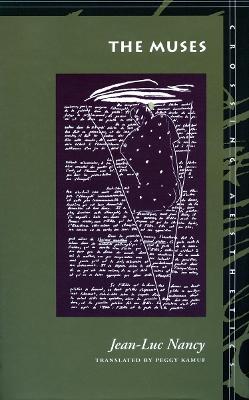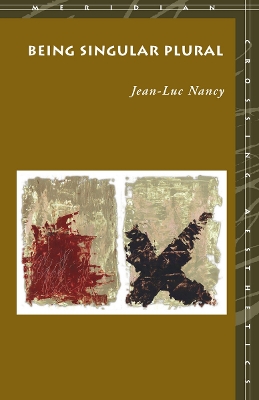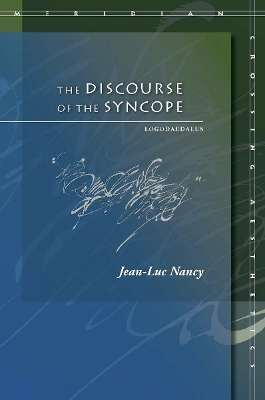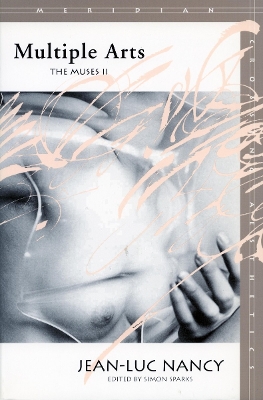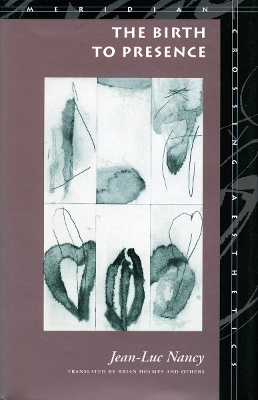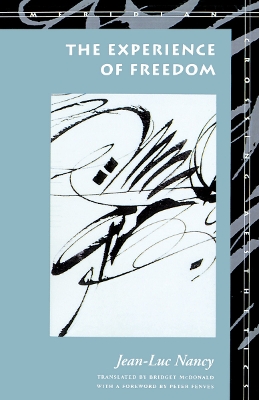Meridian: Crossing Aesthetics
6 total works
This book, by one of the most challenging contemporary thinkers, begins with an essay that introduces the principal concern sustained in the four succeeding ones: Why are there several arts and not just one? This question focuses on the point of maximal tension between the philosophical tradition and contemporary thinking about the arts: the relation between the plurality of the human senses—to which the plurality of the arts has most frequently been referred—and sense or meaning in general.
Throughout the five essays, Nancy’s argument hinges on the culminating formulation of this relation in Hegel’s Aesthetics and The Phenomenology of Spirit—art as the sensible presentation of the Idea. Demonstrating once again his renowned ability as a reader of Hegel, Nancy scrupulously and generously restores Hegel’s historical argument concerning art as a thing of the past, as that which is negated by the dialectic of Spirit in the passage from aesthetic religion to revealed religion to philosophy.
This book, by one of the most innovative and challenging contemporary thinkers, consists of an extensive essay from which the book takes its title and five shorter essays that are internally related to “Being Singular Plural.”
One of the strongest strands in Nancy’s philosophy is his attempt to rethink community and the very idea of the social in a way that does not ground these ideas in some individual subject or subjectivity. The fundamental argument of the book is that being is always “being with,” that “I” is not prior to “we,” that existence is essentially co-existence. Nancy thinks of this “being-with” not as a comfortable enclosure in a pre-existing group, but as a mutual abandonment and exposure to each other, one that would preserve the “I” and its freedom in a mode of imagining community as neither a “society of spectacle” nor via some form of authenticity.
The five shorter essays impressively translate the philosophical insight of “Being Singular Plural” into sophisticated discussions of national sovereignty, war and technology, identity politics, the Gulf War, and the tragic plight of Sarajevo. The essay “Eulogy for the Mêlée,” in particular, is a brilliant discussion of identity and hybridism that resonates with many contemporary social concerns.
As Nancy moves through the exposition of his central concern, being-with, he engages a number of other important issues, including current notions of the “other” and “self” that are relevant to psychoanalytic, political, and multicultural concepts. He also offers astonishingly original reinterpretations of major philosophical positions, such as Nietzsche’s doctrine of “eternal recurrence,” Descartes’s “cogito,” and the nature of language and meaning.
Why is it that the modern conception of literature begins with one of the worst writers of the philosophical tradition? Such is the paradoxical question that lies at the heart of Jean-Luc Nancy's highly original and now-classic study of the role of language in the critical philosophy of Kant. While Kant did not turn his attention very often to the philosophy of language, Nancy demonstrates to what extent he was anything but oblivious to it. He shows, in fact, that the question of philosophical style, of how to write critical philosophy, goes to the core of Kant's attempt to articulate the limits, once and for all, that would establish human reason in its autonomy and freedom. He also shows how this properly philosophical program, the very pinnacle of the Enlightenment, leads Kant to posit literature as its other by way of what is here called the syncope, and how this other of philosophy, entirely its product, cannot be said to exist outside of metaphysics in its accomplishment. This subtle, unprecedented reading of Kant demonstrates the continued importance of reflection on the relation between philosophy and literature, indeed, why any commitment to Enlightenment must consider and confront this partition anew.
This collection of writings by Jean-Luc Nancy, the renowned French critic and poet, delves into the history of philosophy to locate a fundamentally poetic modus operandi there. The book represents a daring mixture of Nancy's philosophical essays, writings about artworks, and artwork of his own. With theoretical rigor, Nancy elaborates on the intrinsic multiplicity of art as a concept of "making," and outlines the tensions inherent in the faire, the "making" that characterizes the very process of production and thereby the structure of poetry in all its forms. Nancy shows that this multiplication that belongs to the notion of art makes every single work communicate with every other, all material in the artwork appeal to some other material, and art the singular plural of a praxis of the finite imparting of an infinity which is actually there in every utterance. In the collection, Nancy engages with the work of, among others, Francois Martin, Maurice Blanchot, and On Kawara.
The epoch of representation is as old as the West. Indeed, representation is the West, understood as what at once designates and expands its own limits. But what comes after the West? What comes after representation's disclosure of its own limit?
The central problem posed in these essays, collected from over a decade of work, is how in the wake of Western ontologies to conceive the coming, the birth that characterizes being. We are now at the limit of representation, where objects as we experience them have been show to be merely objects of representation—or rather, of presentation, since there is nothing to (re)present. The first part of this book, "Existence," asks how, today, one can give sense of meaning to existence as such, arguing that existence itself, as it comes nude into the world, must now be our "sense."
In examining what this birth to presence might be, we should not ask what presence "is"; rather we should conceive presence as presence to someone, including to presence itself. This birth is not the constitution of an identity, but the endless departure of an identity from, and from within, its other, or others. Its coming is not desire but jouissance, the joy of averring oneself to be continually in the state of being born—a rejoicing of birth, a birth of rejoicing.
The second section, "Poetry," asks: What art exposes this? In writing, in the voice, in painting? And what if art is exposed to it? How does it inscribe (or rather, "exscribe," in a term the book develops) the coming existence as such? The author's trajectory in this book crosses those of Hegel, Schlegel, Baudelaire, Nietzsche, Freud, and Heidegger, in their comments on art and politics, existence and corporeality, everyday life and its modes of existence and ecstasy. An analysis that dares this crossing involves all the varied accounts of existence, political as well as philosophical, and all the realms of poverty.
This is the most systematic, the most radical, and the most lucid treatise on freedom that has been written in contemporary Continental philosophy. Finding its guiding motives in Kant's second Critique and working its way up to and beyond Heidegger and Adorno, this book marks the most advanced position in the thinking of freedom that has been proposed after Sartre and Levinas. One could call it a fundamental ontology of freedom if freedom, according to the author, did not entail liberation from foundational acts and the overcoming of any logic that determines the way ontology does, by positing being either as self-sufficient position or as subjected to strictly immanent laws.
Once existence no longer offers itself as an empiricity that must be related to its conditions of possibility or sublated in a transcendence beyond itself, but instead as sheer factuality, we must think this fact, the fact of existence as the essence of itself, as freedom. The question is no longer "Why is there something rather than nothing?" Instead, it becomes "Why these very questions by which existence affirms itself and abandons itself in a single gesture?" If we do not think being itself as a freedom, we are condemned to think of freedom as pure "Idea" or "right," and being-in-the-world, in turn, as a blind and obtuse necessity. Since Kant, philosophy and our world have relentlessly confronted this scission.
